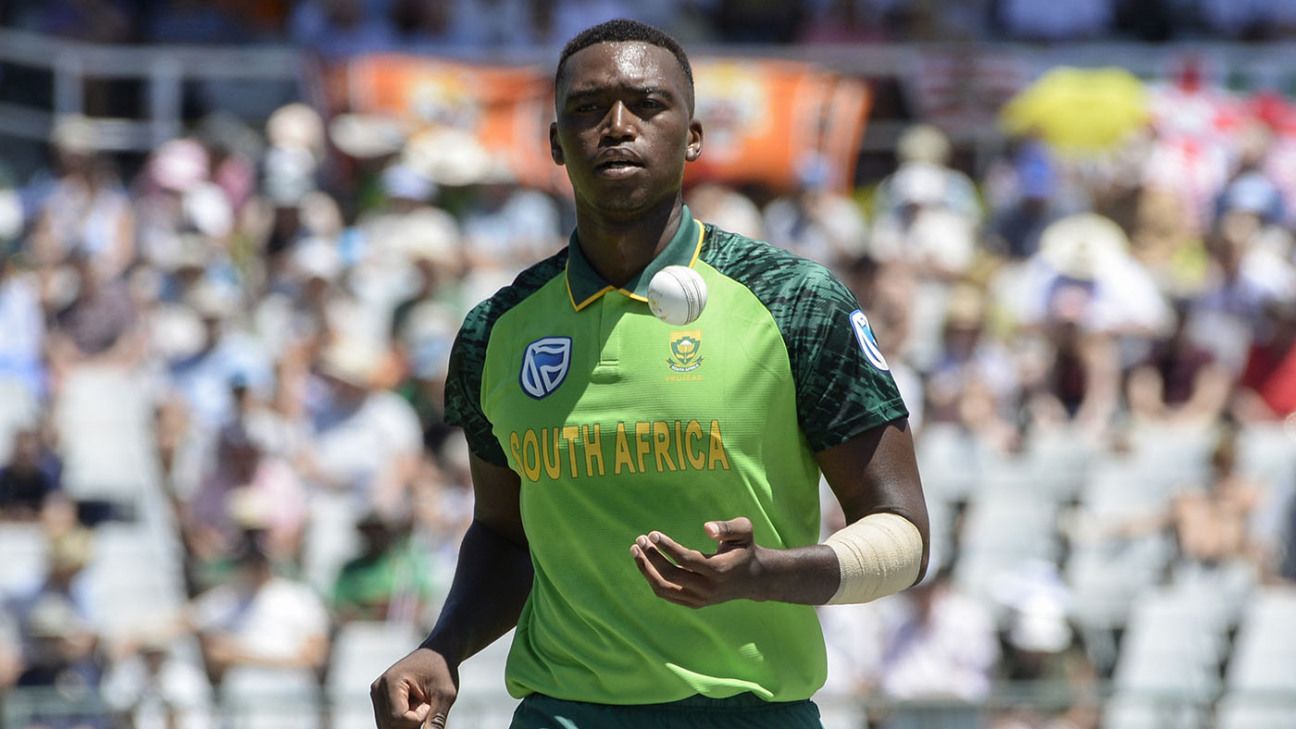South Africa’s cricketers will discuss how they will join the Black Lives Matter movement when they have the opportunity to meet as a group according to Lungi Ngidi. The fast bowler, who was named Cricketer South Africa’s T20 cricketer of the year on Saturday, indicated he would be in favour of supporting the anti-racism cause, especially given South Africa’s history of segregation.
“As a nation, we have a past that is very difficult, with racial discrimination, so it’s definitely something we will be addressing as a team and if we are not, it’s something I will bring up,” Ngidi said, at a virtual press engagement on Monday afternoon. “It’s something that we need to take very seriously and like the rest of the world is doing, make the stand.”
Issues of race are ever-present in South Africa, a country with a history of colonialism and Apartheid, and have been hot-button topics in sport since readmission in 1991. Prior to South Africa’s isolation in 1970, national sports teams were made up of white players only, effectively excluding people of colour from participating at the highest level. In the last 29 years, that has changed, but questions of representation remain. To date, only nine black Africans have played Test cricket for South Africa and Ngidi is the most recent. There remain concerns over the pace of transformation and especially the continued occupation of senior positions by white men.
The national team has been largely silent on race, apart from Temba Bavuma, who found himself at the centre of a storm mid-season, when he was dropped from the Test squad. South Africa’s then-Test captain Faf du Plessis said the team does not “see colour,” and that Bavuma, who had been through a lean patch, needed to force his way back into the team through “weight of runs”. Du Plessis suffered from poor form himself, which earned the wrath of Bavuma supporters, and then stood down as captain. Bavuma was back in the team by the end of the summer and spoke openly about the pressures that came with his skin colour.
For that reason, Ngidi asserted that the team is “well aware” of race dynamics but he explained that they have not had the opportunity to discuss recent events as a group. “I feel we are not together so it’s hard to discuss but once we get back to playing that is definitely something we have to address as a team,” he said.
That may not be for a while with South Africa’s calendar shrouded in uncertainty as they await the ICC’s decision on the T20 World Cup and the rescheduling of their two-Test, five-T20 trip to the Caribbean, which was due to get underway this month. West Indies are currently in England for three Tests ending on July 29 (and both teams will wear the Black Lives Matter logo on their shirts) so the earliest South Africa could hope to play against them could be in August. However, with the Covid-19 pandemic expected to peak in South Africa around the same time, and the players having only just returned to training, it is likely the visit will be delayed further.
A high-performance squad of 45 players was given the greenlight to resume training last week and are currently practicing in groups of no more than five players at their domestic franchise grounds. Next Saturday, 24 of them will play in an exhibition match featuring three teams in the same game, but Ngidi explained they have not had much time to connect, given the restrictions in place.
“We have to book sessions now so there are certain groups of guys that come in at a certain time and when they are done, another group comes in,” Ngidi said. “As the bowlers, we each have our net. We each have our balls. There is no touching and hardly any communication as well. Before going to gym, you have to let them know so they can sanitise the area before you come in and sanitise once you leave for the next group. There’s temperature checks at the gate, there’s hand sanitisers, we fill out forms, it’s a whole process before you can actually bowl a cricket ball. It’s very frustrating but also very necessary at this point.”
Much like England’s Mark Wood, who likened training to a “sci-fi movie,” Ngidi said the situation is taking some time to get used to, not least because he feels like he is playing a group sport, on his own. “It feels like some bio-hazard kind of event has happened. There’s no touching, you barely ever take your masks off other than when you are within a certain distance of people. We no longer go into the change rooms. You get changed in your car and you go straight to the field or straight to the indoor nets. We don’t gather in groups anymore and it feels weird since it’s a team sport. You’re playing by yourself but everyone is still there. It is very different.”
And for bowlers, it will stay different as they are no longer allowed to use saliva to shine the ball. Ngidi and the rest of the pack have yet to strategise how they will counter that, but he has a few ideas. “Once they said there’s no saliva, a few of the batsmen posted on the group that now they are going to be driving on the up so already we can see what type of mentality the batsmen are coming with so now we have to find a game plan to get the ball to swing. Probably a damp towel is the best thing but you’ve got to find something somehow, to shine it.”
